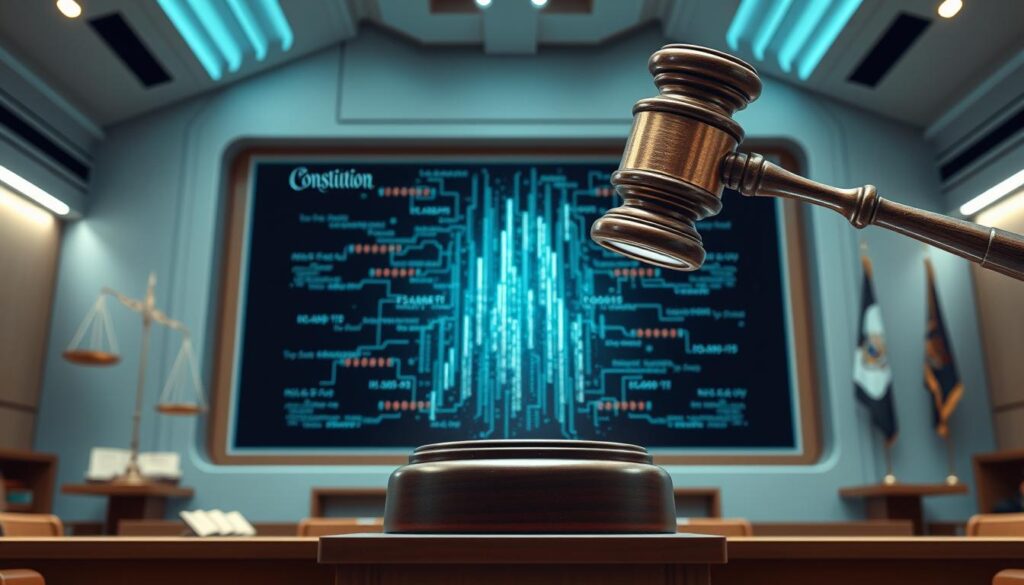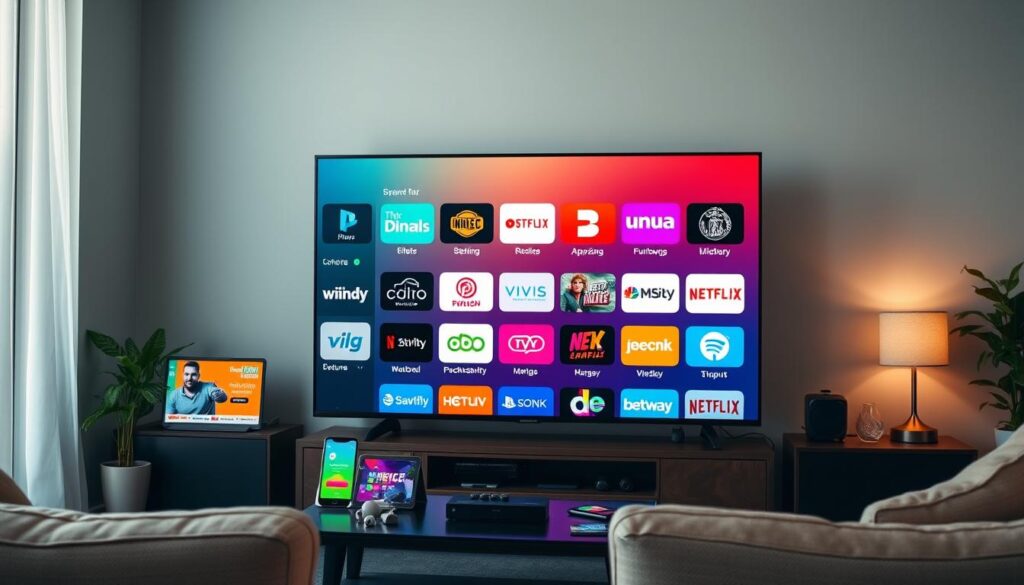Is IPTV Illegal in USA
The rise of Internet Protocol Television (IPTV) has raised many legal questions in the United States. IPTV has changed how we watch digital content, making it more flexible and easy to access. But, the laws around IPTV can be tricky, making it hard for viewers to know what’s legal and what’s not.
This guide aims to clear up the confusion about IPTV’s legality in the USA. We’ll look at the laws, rules, and safe streaming practices. Knowing the legal side of IPTV helps viewers enjoy content without worrying about breaking the law.
Key Takeaways
- IPTV legality in the USA is determined by the source and distribution of the content being streamed.
- Unauthorized IPTV services that infringe on copyrights are illegal, while licensed and legitimate IPTV providers are legal.
- US copyright laws, such as the Digital Millennium Copyright Act (DMCA), play a crucial role in regulating IPTV streaming.
- Consumers should be cautious of IPTV services that offer too-good-to-be-true deals or lack transparent licensing information.
- Exploring legal alternatives, such as official streaming platforms, can ensure a safe and compliant viewing experience.
Understanding IPTV: What It Is and How It Works
IPTV, or Internet Protocol Television, is changing how we watch videos. It’s different from cable or satellite TV because it uses the internet. This means you can watch what you want, when you want, thanks to streaming protocols and content delivery networks.
Different Types of IPTV Services
IPTV services fall into two groups: licensed and unlicensed. Licensed providers have the rights to show content legally. Unlicensed services might not have these rights, which can be risky.
Technical Aspects of IPTV Streaming
IPTV relies on streaming protocols like RTSP, RTP, and RTMP. It also uses content delivery networks (CDNs) for smooth streaming. This ensures you get high-quality videos without long waits or delays.
Common IPTV Applications and Devices
IPTV works on many devices, from smart TVs to mobile phones. You can use apps, web browsers, or special devices to watch IPTV. Its flexibility makes it a favorite for those who like to watch what they want, when they want.
Is IPTV Illegal in USA: Understanding the Legal Framework
IPTV (Internet Protocol Television) legality in the US is complex. It’s shaped by US copyright law, the Digital Millennium Copyright Act (DMCA), and FCC rules.
The legality of IPTV services depends on their content licensing and FCC rules. IPTV services with the right content licenses and FCC compliance are legal under US copyright law. But, those without proper licenses or authorization are illegal and can face legal trouble.
| Legal IPTV Services | Illegal IPTV Services |
|---|---|
| Obtain content licenses from copyright holders | Distribute copyrighted content without permission |
| Comply with FCC regulations | Bypass content licensing and distribution agreements |
| Operate within the framework of US copyright law | Violate US copyright law and DMCA regulations |
It’s important for IPTV users to know the legal risks of their choices. Using unauthorized IPTV can lead to legal issues, data risks, and harm to creators.
“The legality of IPTV services in the US is a complex issue that requires careful consideration of content licensing, distribution agreements, and compliance with relevant laws and regulations.”
Legal vs Illegal IPTV Services: Key Differences
In the world of digital streaming, it’s important to know the difference between legal and illegal IPTV services. Legal services have the right to stream content, while illegal ones often break the law. This means they don’t respect the rights of content creators.
Licensed Content Providers
Legal IPTV services work with content providers who have the right to stream their content. These services make sure they follow the law and have the right to show different types of content. They partner with big studios, networks, and independent producers to offer a wide range of legal streaming options.
Red Flags of Illegal IPTV Services
- Suspiciously low pricing compared to mainstream authorized services
- Lack of clear information about content licensing and provider credentials
- Unreliable or constantly changing channel lineups and service availability
- Unsecured connections and potential data privacy risks
Copyright Implications
Using illegal IPTV services can lead to serious legal problems. It often means breaking the law by using someone else’s work without permission. Creators and distributors work hard to protect their work. Using pirated streams can lead to big fines and even criminal charges for users.
Knowing the difference between legal and illegal IPTV services helps users make better choices. It ensures they respect the rights of content creators and get a safe, reliable streaming experience.
Federal Laws Governing IPTV Streaming in America
In the United States, IPTV streaming is governed by a complex set of federal laws. The Copyright Act, Telecommunications Act, and No Electronic Theft (NET) Act play key roles. These laws affect both IPTV providers and users.
The Copyright Act protects intellectual property. It gives content creators exclusive rights to reproduce, distribute, and perform their work. Streaming copyrighted material without permission is illegal under this act. It can lead to legal trouble for both providers and users.
The Telecommunications Act oversees the cable and satellite TV industry. It ensures IPTV providers follow technical and legal standards. This act is crucial for the operation of IPTV services.
The NET Act makes unauthorized distribution of copyrighted works a crime. It applies even if no money is made. This law is important for IPTV users who might use unlicensed streaming platforms.
These laws together make the legal landscape for IPTV in the U.S. complex. It’s vital for both providers and users to know the difference between legal and illegal IPTV services. Understanding these laws helps avoid legal issues.

Consequences of Using Unauthorized IPTV Services
Using illegal IPTV services can lead to serious problems. It affects individuals, content creators, and the whole entertainment industry. The risks include legal penalties, cybersecurity threats, and big impacts on the industry.
Legal Penalties and Fines
Streaming copyrighted content without a license can lead to big legal troubles. Copyright infringement penalties can be very high, with fines from thousands to millions of dollars. Repeat offenders might even face jail time. It’s crucial to know the legal risks of using unauthorized IPTV services.
Risk to Personal Data
Illegal IPTV platforms often don’t protect user data well. This means a higher risk of data breaches and identity theft. Sharing personal info on these platforms can lead to big financial losses and the theft of sensitive data.
Impact on Content Creators
Unauthorized IPTV services hurt the entertainment industry and its creators. They don’t pay creators the royalties they deserve. This makes it hard for new and innovative content to be made, which is a loss for everyone.
In summary, using unauthorized IPTV services has wide-reaching effects. It harms content creators, puts personal data at risk, and weakens the entertainment industry. It’s important for viewers to choose legal, licensed streaming options to support a healthy media world.
| Consequence | Description |
|---|---|
| Legal Penalties and Fines | Copyright infringement can result in thousands to millions of dollars in fines, as well as potential jail time for repeat offenders. |
| Risk to Personal Data | Illegal IPTV platforms often lack robust cybersecurity measures, exposing users to data breaches and identity theft. |
| Impact on Content Creators | The use of unauthorized IPTV services deprives content creators of rightful royalties and revenue, undermining the sustainability of the creative ecosystem. |
How to Identify Legal IPTV Service Providers
In the world of streaming, it’s key to know the difference between legal authorized streaming platforms and IPTV providers that aren’t. Finding the right IPTV providers can be tough. But, with the right info, you can pick the legal ones and watch your favorite shows without worry.
When looking at IPTV services, check if they have content licensing verification. Legal IPTV services have the rights to stream content. They should show their licensing agreements and partnerships with content makers.
- Good IPTV providers will have a detailed Terms of Service that talks about their content and how they share it.
- Be careful of IPTV services that offer lots of content for very little money. This might mean they’re breaking the law.
Legal IPTV services are also open and help their customers. They have a strong online presence, clear contact info, and answers to common questions. Their customer service team is ready to help with any issues.
| Legal IPTV Providers | Illegal IPTV Services |
|---|---|
| Secure content licensing agreements | Lack of content licensing verification |
| Transparent terms of service and policies | Ambiguous or misleading terms of service |
| Established online presence and customer support | Limited or non-existent customer support |
By doing your homework on IPTV providers, you can make sure you’re using legal services. This helps protect the rights of content creators and keeps the streaming world healthy. Always choose authorized streaming platforms to avoid legal trouble.
Rights of Content Creators and Distributors
In today’s digital world, the rights of content creators and distributors are key. They shape what we watch and read. It’s vital to know how to protect their intellectual property rights.
Copyright Protection Measures
Creators and distributors use strong content protection technologies to keep their work safe. They use digital rights management (DRM), watermarking, and encryption. These tools help stop unauthorized copying and sharing of their work.
Content Licensing Requirements
Creators and distributors must follow strict licensing agreements to share their content legally. These agreements cover things like where and how their work can be used. They also talk about money sharing and who gets to use the content first. Following these rules is crucial for the content world to work right.
Knowing about the rights of creators and distributors helps us make better choices online. It supports a fair and thriving content industry. This way, creators get paid for their work, and we get to enjoy real, quality content.
“The protection of intellectual property rights is crucial for fostering innovation and creativity in the digital age.”
Safe Alternatives to Questionable IPTV Services
In today’s world, it’s easy to get confused between legal and illegal streaming. Luckily, there are many legal streaming platforms, subscription-based services, and ad-supported streaming options in the USA. These services offer a wide range of content while following copyright laws.
Netflix is a top choice for legal streaming. It offers a huge library of movies, TV shows, and original content. Hulu is another great option, with a vast collection of TV programs and original series. Amazon Prime Video also stands out, with movies, TV shows, exclusive content, and live sports.
For those who miss traditional cable TV, YouTube TV and DirecTV Stream are good choices. They provide live and on-demand channels within legal limits. These subscription-based services also offer cloud-based DVR and streaming on multiple devices.
If you don’t want to pay for a subscription, ad-supported streaming platforms like Pluto TV, Tubi, and The Roku Channel are great. They offer free content, including movies, TV shows, and news, with occasional ads.
| Streaming Service | Pricing Model | Content Offerings |
|---|---|---|
| Netflix | Subscription-based | Movies, TV shows, original content |
| Hulu | Subscription-based | TV shows, movies, original content |
| Amazon Prime Video | Subscription-based | Movies, TV shows, original content, live sports |
| YouTube TV | Subscription-based | Live TV channels, on-demand content |
| Pluto TV | Ad-supported | Movies, TV shows, news, and more |
Exploring these legal streaming platforms lets viewers enjoy a wide range of content safely. These alternatives offer a reliable and guilt-free way to meet your entertainment needs.

Latest Legal Developments in IPTV Streaming
The world of IPTV streaming is changing fast. There are many new laws, court decisions, and rules for the industry. It’s important for both providers and users to keep up with these changes.
Streaming Legislation Updates
Recently, some states have made new laws to fight illegal IPTV services. For example, California has the Piracy Prevention Act. It can lead to big fines and jail for using unauthorized IPTV. New York is also making streaming providers follow stricter rules.
Landmark Court Rulings
There have been key court cases that have shaped the law. The U.S. Supreme Court said Aereo was breaking copyright laws. This ruling has had big effects on the IPTV world.
| Court Case | Ruling | Impact |
|---|---|---|
| ABC v. Aereo | Aereo violated copyright law | Established that companies cannot retransmit broadcast signals without permission |
| Disney v. VidAngel | VidAngel’s service was illegal | Reaffirmed that content distributors must abide by licensing agreements |
Industry Regulations and Standards
The IPTV world is also seeing new rules from itself. For example, the Motion Picture Association of America (MPAA) is working with internet providers. They aim to stop unauthorized IPTV services.
As laws and rules keep changing, it’s vital for IPTV providers and users to stay updated. This helps the industry grow and stay safe for everyone.
Conclusion
The legality of IPTV in the USA is complex. There are both legal and illegal IPTV services. Legal ones follow the law, while illegal ones risk harm to users and creators.
Knowing the difference between legal and illegal IPTV is key. This knowledge helps people make smart choices. It ensures they stream responsibly and respect the law.
As digital entertainment grows, staying informed is vital. Choosing legal IPTV services supports creators and ensures quality content. This way, everyone benefits from a fair and sustainable digital media world.
Choosing IPTV services has its consequences. Opting for legal IPTV means enjoying its benefits while supporting ethical media. It’s a way to contribute positively to the digital content world.







